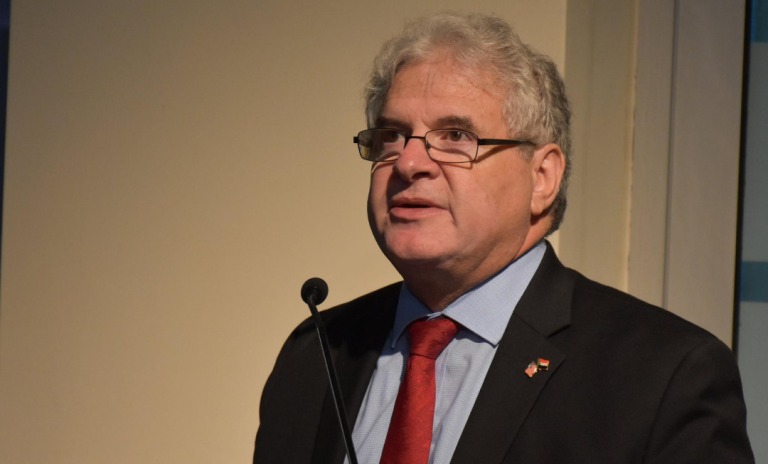Lack of staff was the main cause for delaying Sudan sanctions relief: U.S. diplomat

July 24, 2017 (KHARTOUM) – U.S. Chargé affairs to Khartoum Koutsis said on Monday said the slow pace of staffing process in the State Department was the main reason for the postponement of sanctions relief for Sudan.
Ambassador Koutsis met with the Speaker of the National Assembly Ahmed Ibrahim Omer to brief him about the reasons behind the decision of President Donald Trump to delay the lift of economic sanctions on Sudan for three months.
Ambassador Koutsis told reporters that the meeting discussed the implementation of the five tracks, human rights and religious freedom and the future of Darfur hybrid peacekeeping mission.
He further rejected accusations that his country delayed the lifting of the sanctions in accordance with a plan aimed at dividing the Sudan within the framework of the “New Middle East” plan.
“We have heard many accusations and some analyses on the postponement of sanctions, but we invite you to take our word .. that the new US administration needs more time to discuss this file,” he said.
In a background briefing to the press on 12 July, U.S. officials members of the interagency assessment team said they need more time “to review Sudan’s actions and to establish that the government has demonstrated sustained, positive actions across all the areas (five tracks) that are set out in the executive order”.
They further said they want to discuss three matters that are not included in the five track framework agreement, pointing to Sudan’s human rights record, religious freedom and its commitment to UN sanctions against North Korea.
Observers in Washington said they feel that the assessment team realised the pressure generated by the intervention of 53 lawmakers and activists and preferred to leave no gap in their decision that could open the door to more criticism.
According to the Spokesperson of the National Assembly Speaker Abdel Majed Haroun, the American diplomat explained the U.S. point of view over the delay of sanctions relief.
The lack of staffing in the State Department particularly in the Bureau of African Affairs and the official of Sudan special envoy, and the impact of a letter addressed to President Donald Trump by 53 Congressmen demanding to delay the lift of sanctions played an important role in the 11 July decision, said Haroun referring to the conversation between the Speaker and the US. diplomat.
The bipartisan group of U.S. lawmakers urged the President to delay the lift of sanctions for one year until “your Administration has been able to fully staff the Department of State and National Security Council, and you have named a Special Envoy for Sudan and South Sudan,” they said in a letter sent on 30 June.
The parliamentary spokesperson underscored that the Congress had been lobbied by advocacy groups.
“The Speaker of the Parliament expressed the disappointment of Sudanese people over the delay of this decision. He said he is looking forward to a decision that enables the Sudanese and American peoples to exercise their normal lives and benefit from each other’s capabilities and engage in a positive relationship,” Haroun said.
He added that Omer welcomed the joint steps that have been achieved and urged all parties to work together in the coming period so that they can meet the commitments that constitute the goals of joint action.
Last March, the Speaker of the National Assembly visited the United States where he met with government officials and Congressmen to convince them to support the lift of sanctions.
Also, a day before the decision to delay the lift of sanctions, Omer called to not react negatively in case that President Trump for any reason does not approve the lift of sanction and to keep up the efforts to persuade Washington to repeal the sanctions.
(ST)
